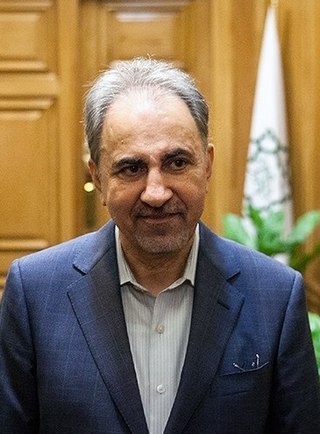
Mohammad-Ali Najafi is an Iranian mathematician and reformist politician who was the Mayor of Tehran, serving in the post for eight months, until April 2018. He held cabinet portfolios during the 1980s, 1990s and 2010s. He is also a retired professor of mathematics at Sharif University of Technology.

The Constitution of Tunisia is the supreme law of the Tunisian Republic. The constitution is the framework for the organization of the Tunisian government and for the relationship of the federal government with the governorates, citizens, and all people within Tunisia. Tunisia's first modern constitution was the Fundamental Pact of 1857. This was followed by the Constitution of 1861, which was not replaced until after the departure of French administrators in 1956, by the constitution of 1959. It was adopted on 1 June 1959 and amended in 1999 and 2002, after the Tunisian constitutional referendum of 2002.

The Tunisian Revolution was an intensive 28-day campaign of civil resistance. It included a series of street demonstrations which took place in Tunisia, and led to the ousting of longtime president Zine El Abidine Ben Ali in January 2011. It eventually led to a thorough democratization of the country and to free and democratic elections, which had led to people believing it was the only successful movement in the Arab Spring.

Presidential elections were held in Tunisia on 23 November 2014, a month after parliamentary elections. They were the first free and fair presidential elections since the country gained independence in 1956, and the first direct presidential elections after the Tunisian Revolution of 2011 and the adoption of a new Constitution in January 2014.
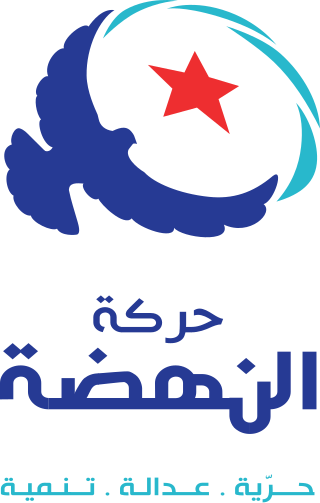
The Ennahda Movement, also known as the Renaissance Party or simply known as Ennahda, is a self-defined Islamic democratic political party in Tunisia.

An election for a constituent assembly in Tunisia was announced on 3 March 2011 and held on 23 October 2011, following the Tunisian revolution. The Assembly had 217 members. It was the first free election held in Tunisia since the country's independence in 1956, as well as the first election in the Arab world held after the start of the Arab Spring.

Habib Essid is a Tunisian politician who was Head of Government of Tunisia from 6 February 2015 to 27 August 2016. He was the first Head of Government to be appointed following the adoption of the new constitution and thus considered to be the first Head of Government of the Second Tunisian Republic. He previously served as Minister of the Interior in 2011.

The Constituent Assembly of Tunisia, or National Constituent Assembly (NCA) was the body in charge of devising a new Tunisian constitution for the era after the fall of President Zine El Abidine Ben Ali and his Constitutional Democratic Rally (RCD)–regime. Convoked after the election on 23 October 2011, the convention consisted of 217 lawmakers representing Tunisians living both in the country and abroad. A plurality of members came from the moderate Islamist Ennahda Movement. The Assembly held its first meeting on 22 November 2011, and was dissolved and replaced by the Assembly of the Representatives of the People on 26 October 2014.
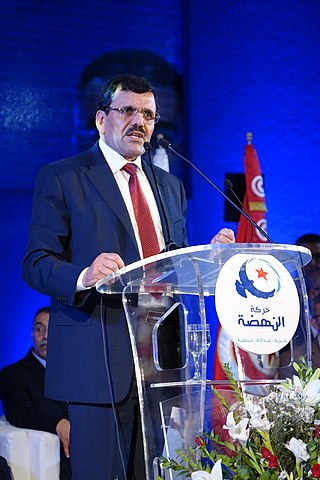
The first cabinet of Tunisian Head of Government Ali Laarayedh was presented on 8 March 2013. It was approved on 13 March 2013 by the Constituent Assembly of Tunisia. Laarayedh resigned on 9 January 2014. His successor, Mehdi Jomaa, took office on 29 January 2014.

Mehdi Jomaa is a Tunisian engineer and was the acting Prime Minister of Tunisia from 29 January 2014 to 6 February 2015. He was chosen on 14 December 2013. Jomaa was Minister of Industry in the Ali Laarayedh government.
A political crisis evolved in Tunisia following the assassination of leftist leader Mohamed Brahmi in late July 2013, during which the country's mainly secular opposition organized several protests against the ruling Troika alliance that was dominated by Rashid al-Ghannushi's Islamist Ennahda Movement. The events came as part of the aftermath of the Tunisian Revolution which ousted the country's longtime president Zine El Abidine Ben Ali, followed by a general election which saw Ennahda win a plurality alongside Moncef Marzouki's allied Congress for the Republic (CPR). The crisis gradually subsided when Prime Minister Ali Laarayedh resigned and a new constitution was adopted in January 2014.

Parliamentary elections were held in Tunisia on 26 October 2014. Campaigning started on 4 October 2014. They were the first free regular legislative elections since independence in 1956, and the first elections held following the adoption of the new constitution in January 2014, which created a 217-seat Assembly of the Representatives of the People. According to preliminary results, Nidaa Tounes gained a plurality of votes, winning 85 seats in the 217-seat parliament, beating the Ennahda Movement and many smaller parties.
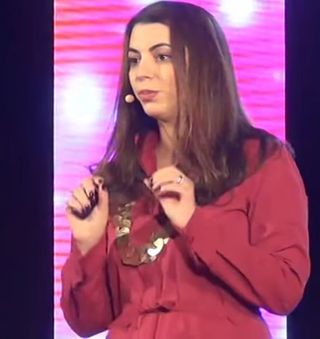
Amel Karboul is a Tunisian author, speaker, politician, philanthropist, and business leader. Karboul was the first woman in history to occupy Tunisia's Minister of Tourism position as the youngest member of the Mehdi Jomaa government from January 2014 to February 2015.
On 16 July 2014, militants from the Uqba Ibn Nafi Battalion attacked two checkpoints in the Chaambi Mountains killing fourteen Tunisian soldiers and injuring twenty-five. The 2014 Chaambi Mountains attack is the deadliest militant skirmish involving the Tunisian Armed Forces since their independence in 1956.
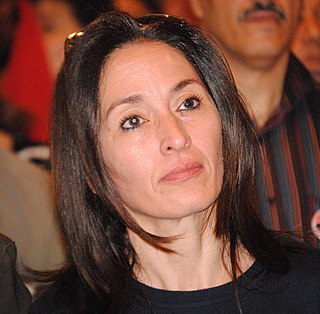
Selma Hédia Mabrouk is a secular Tunisian politician who served on the 2011 Tunisian Constituent Assembly as a representative of Ettakatol party for the Ben Arous district. She made international headlines when she revealed that the initial draft of the constitution was attempting to define women as a "complement with the man in the family, and an associate to the man in the development of the country." The revelation was shocking to Tunisian society, where women had achieved rights unknown in the rest of the Arab world, and caused immediate outrage. Mabrouk's social media posts were instrumental in having those passages struck from the final constitution.

Tunisian Alternative is a Tunisian political party founded on 29 March 2017 by former prime minister Mehdi Jomaa.

Ghazi Jeribi is a Tunisian politician. He served as Minister of Defence in the cabinet of Prime Minister Mehdi Jomaa. He also served as Minister of Justice in the cabinet of Prime Minister Youssef Chahed.
Hafedh Ben Sala is a Tunisian politician. He served as Minister of Justice in the cabinet of Prime Minister Mehdi Jomaa.
The following lists events that happened during 2014 in the Tunisian Republic.

The 2021 Tunisian self-coup took place on 25 July 2021, when Tunisian President Kais Saied dismissed the government of Hichem Mechichi, suspended the Assembly of the Representatives of the People and revoked the immunity of its members. Described as a self-coup, the move came after a period of political instability marked by a series of protests against the Ennahda-backed government and the collapse of the Tunisian healthcare system amidst the COVID-19 pandemic in the country.















